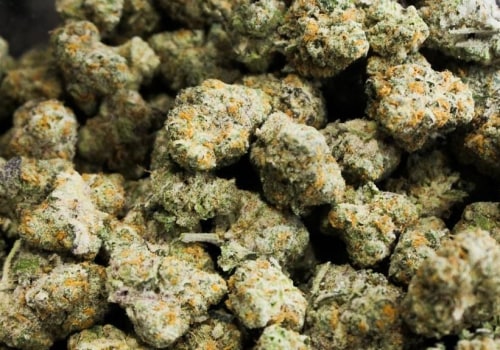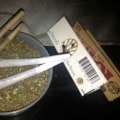States preemptively restrict or outright ban THC delta-8 as federal regulators step in to clarify its legality. States restricted or banned delta-8 THC, prompting outcry from users, companies, manufacturers and sellers in the cannabis industry. States that ban delta-8 THC? Which ones have already banned it? What do the federal government and the DEA have to do with this? Currently, 20 United States,. States have restricted or banned delta-8 THC and four other states are currently reviewing its legal status.
Here's updated information on whether delta-8 THC is available and legal in your state. We work day and night to bring you the latest news about the state legality of delta-8 and its products. Alaska does not allow the use, possession, sale, distribution, or production of delta-8 and classifies it as a Schedule IIIA controlled substance under state law. List IIIA includes all tetrahydrocannabinols, such as delta-10 and THC-O.
Possession of delta-8 ranges from a class C misdemeanor to a felony, depending on the amount and intent. The Delta-8 is illegal in Arizona under state law. The use, possession, sale, distribution and production of delta-8 products are prohibited and are classified as a Schedule I controlled substance. Annex I includes all tetrahydrocannabinols, such as delta-10 and THC-O, as well as marijuana.
The penalties for possession of the delta-8 are probably the same as for possession of marijuana. If you are caught with two pounds of marijuana or less, it is a class 6 felony punishable by up to two years in prison. Learn more about the legal status of the delta-8 in Arizona. The Delta-8 is illegal in Arkansas under state law.
The use, possession, sale, distribution and production of delta-8 and its products are not allowed and are classified as a Schedule IV controlled substance, placing it along with all other tetrahydrocannabinols. The penalties for possession of the delta-8 in Arkansas vary depending on the amount and intent. Possession of less than 28 grams of delta-8 is a class A misdemeanor punishable by up to one year in prison. If you have four or more criminal convictions on your record, possession of less than 28 grams of delta-8 is a class D felony punishable by up to six years in prison.
Delta-8 is restricted in California under state law. The use, possession, sale, distribution and production of delta-8 products derived from hemp and marijuana are regulated. While you can't have any hemp-derived product with more than 0.3% delta-8 THC, you can buy up to 28.5 grams of marijuana-derived delta-8 at an authorized dispensary. Check out the latest Delta-8 updates in California.
Surprisingly, delta-8 isn't legal in Colorado despite very relaxed medical and recreational marijuana laws. The state does not allow the use, possession, sale, distribution and production of delta-8 products following a notice from the Colorado Department of Health & Environment (CDPHE). The notice states that “chemically modifying or converting any natural cannabinoid in industrial hemp does not meet the legal definition of an 'industrial hemp product'. As a result, Colorado considers delta-8 to be a controlled substance, as described in SB 14-184 and the Uniform Controlled Substances Act.
Learn more about the legal status of the delta-8 in Colorado. Delta-8 is not legal in Delaware, which means that the state does not allow the use, possession, sale, distribution and production of delta-8 products under state law. While Delaware recently decriminalized the simple possession of marijuana in small quantities, the state clarifies that all tetrahydrocannabinols are prohibited substances under Schedule I of its Uniform Controlled Substances Act. Penalties for possession of the delta-8 range from fines to extended periods of imprisonment, depending on the amount and intent.
Hemp-derived delta-8 is legal in Florida under state law, meaning that its use, possession, sale, distribution and production are allowed within its borders without risk of sanction or prosecution. There are also no limits on possession. However, delta-8 derived from marijuana is not legal in Florida. Marijuana and compounds derived from marijuana are strictly illegal.
Learn more about the legal status of the delta-8 in Florida. Indiana legalized hemp and all hemp-derived compounds following Senate Bill 156, which aligned its laws with the federal Agricultural Improvement Act (Farm Bill). Under state law, hemp-derived delta-8 is currently legal in Indiana, and its use, possession, purchase, sale, distribution and production are permitted within state borders. However, since medical and recreational cannabis is illegal in Indiana, state law also prohibits delta-8 derived from marijuana.
First-time convictions for marijuana-derived products in any quantity are punishable by up to 180 days in jail. Learn more about the legal status of the delta-8 in Indiana. While many believe that delta-8 is legal in Kentucky, it's not. Legal counsel for the Kentucky Department of Agriculture reportedly released a memorandum stating that delta-8 derived from hemp and marijuana is a controlled and illegal substance under federal law, meaning that it is also prohibited by state law.
Police have raided several delta-8 vendors. The Kentucky Hemp Association is currently suing the state and seeking a court order to stop any other raid. Learn more about the legal status of delta-8 in Kentucky. Only state-regulated delta-8 products can be sold, distributed and manufactured after the passage of House Bill 4517, signed by Governor Whitmer.
No delta-8 seller in Michigan can sell delta-8 products without the appropriate license from the Michigan Marijuana Regulatory Agency (MMRA), which regulates marijuana and delta-8 THC derived from marijuana. Learn more about the legal status of the delta-8 in Michigan. Delta-8 is perfectly legal in Missouri and does not classify it as a controlled substance following the passage of House Bill 2034, which legalized hemp and hemp-derived compounds. This bill means that the use, possession, sale, distribution, purchase and production of hemp-derived delta-8 is legal under state law.
Marijuana is illegal, but decriminalized if caught with 10 grams or less. Penalties for possession of marijuana or delta-8 derived from marijuana are punishable by a fine. However, it is still classified as a misdemeanor. It is not considered a controlled substance under state law under the Nebraska Hemp Cultivation Act (Statutory Act 65), which was later amended and revised from its existing hemp laws to match the federal Agricultural Improvement Act (Agricultural Act).
This bill means that the use, possession, sale, distribution, purchase and production of hemp-derived delta-8 is legal in Nebraska under state and federal law. Learn more about delta-8 in Nebraska. Delta-8 is illegal in Nevada and is a controlled substance under Schedule I of the state's Controlled Substances Act, which places it together with delta-9, THC and other isomers. The classification of delta-8 in Nevada means that the use, possession, sale, distribution, purchase and production of delta-8 hemp-derived products are prohibited by state law.
Possession of hemp-derived delta-8 can be punishable by jail terms or significant fines. Learn more about the legal status of delta-8 in Nevada. The Delta-8 is restricted in New York. The sale, distribution and production of delta-8 products are banned in the state following an announcement by the New York Cannabis Control Board (CCB), citing lack of security and improper labeling.
Later, a CCB spokesman stated that delta-8 could later be regulated through an adult program similar to its recreational marijuana program. However, it is not clear whether the use and possession of hemp-derived delta-8 or marijuana are punishable under state law. Learn more about the legal status of the delta-8 in New York. Hemp-derived delta-8 is legal under Oklahoma State law and is not listed as a controlled substance after the enactment of the Oklahoma Industrial Hemp Program.
This law legalized hemp and hemp-derived compounds, including delta-8, meaning that the use, possession, sale, distribution, purchase and production of delta-8 products is perfectly legal throughout the state. However, recreational marijuana and delta-8 derived from marijuana are not legal. Delta-8 is legally legal in South Carolina, but Attorney General Alan Wilson says that delta-8 products derived from hemp plants that have the federal THC limit of 0.3% are not allowed anywhere in the state. Wilson's comment on the legality of delta-8 in South Carolina means that the use, possession, sale, distribution and production of delta-8 products are in a gray area, but are likely not yet officially banned.
Learn more about the legality of delta-8 in South Carolina. However, more than a month later, the Texas Department of State Health Service (DSHS) updated its website, claiming that delta-8 is an illegal controlled substance banned in the state. Hometown Hero, an Austin-based delta-8 seller, fought against DSHS, sued them and sought a court order. In November, the court granted Hometown Hero's request for a temporary injunction, declaring delta-8 legal for the time being.
Learn more about the legal status of delta-8 in Texas (and keep up to date with any recent changes with a timeline of live events). Delta-8 is not legal in Vermont following an announcement from the Vermont Agriculture, Farms and Markets Agency (AAFM), which oversees and regulates the state's hemp program. The AAFM believes that the possession, sale and manufacture of synthetic delta-8 products are prohibited by state law and could be classified as controlled substances. Therefore, the possession, sale and manufacture of delta-8 products is likely punishable under state law.
The state does not consider it a controlled substance under its Drug Control Act, following House Bill 1839, which legalized hemp and hemp-derived compounds, separating them from compounds derived from marijuana and marijuana. Therefore, the use, possession, sale, distribution, purchase and production of delta-8 products are legal under state law. Similarly, marijuana and marijuana-derived delta-8 are also legal in Virginia, meaning that the use and possession of marijuana-derived delta-8 is not prohibited by state law. Learn more about the legal status of the delta-8 in Virginia.
The Delta-8 is not legal in Washington. The state classifies delta-8 as a Schedule I controlled substance under its Uniform Controlled Substances Act. Its illegality was further clarified by the Washington State Liquor and Cannabis Board (WSLCB), stating that the production and manufacture of delta-8 products requires a synthetic and chemical process, which is contrary to state laws on hemp. However, the rules surrounding the use and possession of delta-8 products are not clear.
Learn more about the legal status of the delta-8 in Washington. Delta-8 is perfectly legal in Wisconsin. The state does not classify delta-8 derived from hemp plants that carry delta-8; it is one of the 113 cannabinoids found in cannabis varieties (hemp or marijuana) and a variant of delta-9-tetrahydrocannabinol (THC). It's psychoactive and intoxicating, and causes a “high” when consumed.
States are restricting or banning delta-8 is the result of confusing, contradictory and unclear federal guidelines. This confusion led Delta-8 to a legal gray area. Were delta-8 users using a potentially illegal substance? Were the producers of the delta-8 creating a controlled substance? Did the delta-8 vendors sell banned products? These questions had vague answers and the concerns were (and still are) very real. Within this final rule, the DEA stated that all tetrahydrocannabinols “of synthetic origin” remain Schedule I controlled substances.
Why is it so important and how does it relate to the delta-8? Well, for companies to have enough delta-8 THC in their products, it must be converted from cannabidiol (CBD) through a structural isomerization process carried out under laboratory conditions. Amidst the chaos, many have forgotten about the Federal Analogical Act, an important section of the Controlled Substances Act (CSA) created to fight synthetic “designer drugs” in the 1980s. The specific purpose of the Federal Analogical Law is to identify chemicals and substances that are significantly similar to illegal drugs and to classify them as controlled substances in Schedule I or Schedule II of the CSA. In this case, it's not far-fetched to suggest that delta-8, a chemically similar analogue of federally illegal delta-9 THC, is actually a controlled substance.
Why? Because it is a psychoactive and intoxicating delta-9 variant of THC that has recently become an unregulated market, with very little research to verify its effects. The mass exodus of delta-8 THC across the U.S. UU. It has been received quite silently.
This is not surprising, to be honest. States have been extremely covert about their handling of the delta-8 for the past month or so. The dizzying pace at which the delta-8 is currently banned doesn't help either. One of the most notable answers is that of the United States Hemp Authority, a renowned external hemp certification agency.
The president of the agency, Marielle Weintraub, Ph, D. States aren't likely to stop doing so, simply because it's now perceived as a federally controlled substance. At this time, the United States Hemp Authority will not certify any delta-8 products. New York has now become the most recent in the United States.
Amendments by the New York State Department of Health to the Official Collection of Codes, Rules and Regulations of the State of New York prohibit manufacturers, companies and sellers from producing, selling and distributing delta-8 products. Delta-8 will reportedly be regulated by the Michigan Marijuana Regulatory Agency (MRA), but there is no talk of outright banning the cannabinoid. Delta-8 producers must have their products go through official procedures and undergo rigorous testing before going on sale to ensure public health and safety. While the health and safety of Michigan residents are important, some smaller hemp and delta-8 producers will now face tougher financial obstacles.
As the federal government approaches and many of the United States,. States are struggling to close legal loopholes, the fate of the delta-8 doesn't look good. What is worrying is that the federal government and its band of cheerful men from the DEA will be relentless in their attempt to shut down the delta-8, leaving users, manufacturers, producers and sellers of hemp in trouble. The booming delta-8 market is a gold mine for many hemp companies and getting rid of it will be a serious blow.
States will continue to fight against attempts by the federal government to close the thriving delta-8 market for THC so that delta-8 remains available to people in need across the country. Although Washington is a cannabis-friendly state, Delta 8 was purposely banned. Delta-8 is illegal under California state law. It is considered prohibited to use, possess, sell, distribute and produce delta-8 products derived from hemp and marijuana.
While consumers cannot buy or possess any quantity of hemp-derived delta-8, they can purchase delta-8 derived from marijuana at an authorized dispensary. Although Washington has fully legalized THC delta 9 for medical and recreational purposes, THC delta 8 was recently banned. Hemp-derived delta-8 is legal in Massachusetts and is not listed as a controlled substance after the passage of Bill H. Delta-8 is legal in Virginia and is not classified as a controlled substance by state law following the passage of House Bill 2694. In addition to delta-9 THC, there is much less research on individual cannabinoids than on the cannabis plant as a whole.
Hemp-derived delta-8 is not considered an illegal substance controlled by the state and is perfectly legal under state law, which coincides with federal law following the passage of Legislative Document 1159. States that have legalized and regulated Delta 9 products want the same for any other tetrahydrocannabinol that will be distributed at the retail level. Distillates are not as common as oils and tinctures, since THC delta 8 is only found in minimal amounts in cannabis plants, making it difficult to isolate them. However, the bill does not address delta-8 levels of THC, an omission that makes it legal for sellers to sell the compound, often as groceries, vaping cartridges and tinctures, without any oversight. On October 15, the Texas Department of State Health Services posted an update on its Consumable Hemp Program page that read: “Chapter 443 of the Texas Health and Safety Code (HSC 44), established by House Bill 1325 (86th Legislature), allows consumable products from hemp in Texas that does not exceed 0.3% of Delta-9.tetrahydrocannabinol (THC).
Under state law, which is consistent with the federal law described in the Agricultural Improvement Act (Agricultural Act), the use, possession, sale, distribution, purchase and production of delta-8 products is allowed. However, recreational marijuana for adults over 21 years of age is legal in Montana, although it is not clear if delta-8 derived from marijuana is allowed under the same laws as cannabis. Under state law, delta-8 is legal in New Hampshire and is not considered a prohibited controlled substance following the passage of House Bill 459, which extensively legalized hemp and hemp-derived compounds, including delta-8, are converted from CBD, that process and the intoxicating side and psychoactive. The effects of the Delta-8 have provoked the anger of many regulatory bodies and legislators.
. .










